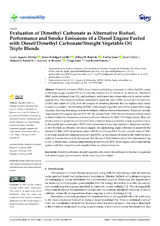Mostrar el registro sencillo del ítem
Evaluation of Dimethyl Carbonate as Alternative Biofuel. Performance and Smoke Emissions of a Diesel Engine Fueled with Diesel/Dimethyl Carbonate/Straight Vegetable Oil Triple Blends
| dc.contributor.author | Aguado-Deblas, Laura | |
| dc.contributor.author | Hidalgo-Carrillo, J. | |
| dc.contributor.author | Bautista, Felipa M. | |
| dc.contributor.author | Luna, Carlos | |
| dc.contributor.author | Calero, Juan | |
| dc.contributor.author | Posadillo, Alejandro | |
| dc.contributor.author | Romero, Antonio A. | |
| dc.contributor.author | Luna, Diego | |
| dc.contributor.author | Estévez, R. | |
| dc.date.accessioned | 2021-02-08T09:44:16Z | |
| dc.date.available | 2021-02-08T09:44:16Z | |
| dc.date.issued | 2021 | |
| dc.identifier.uri | http://hdl.handle.net/10396/21042 | |
| dc.description.abstract | Dimethyl carbonate (DMC) is an interesting blending component for diesel fuel (D) owing to the high oxygen content (53 wt.%) and the absence of C–C bonds in its structure. Moreover, DMC can be produced from CO2 and methanol, which provides a renewable way to reduce anthropogenic CO2. This research has been addressed to assess the use of DMC as a solvent of sunflower oil (SO) and castor oil (CO), with the purpose of obtaining biofuels that can replace fossil diesel as much as possible. The blending of DMC with straight vegetable oils (SVOs) reduces their high viscosity, allowing their usage as drop-in biofuels without chemical treatments. Based on viscosity requirements of European Standard EN 590, the optimal DMC/SVO double blends have been tested as direct biofuels by themselves or mixed with fossil diesel in D/DMC/SVO triple blends. Relevant physico-chemical properties of fuels have been analyzed. Engine parameters such as power output, brake-specific fuel consumption (BSFC) and soot emissions have been studied to determine the effect of new biofuels on efficiency of a diesel engine. An outstanding engine efficiency is shown by the studied D/DMC/SVO triple blends, either with SO or CO as an SVO. The low calorific value of DMC is the main reason for reduction in power and BSFC, as the amount of diesel in the triple blends is reduced. Experimental results demonstrate that the use of these biofuels allows the replacement of up to 40% of fossil diesel, without compromising the power and BSFC of the engine, and accomplishing optimal cold flow properties and a marked drop in exhaust emissions. | es_ES |
| dc.format.mimetype | application/pdf | es_ES |
| dc.language.iso | eng | es_ES |
| dc.publisher | MDPI | es_ES |
| dc.rights | https://creativecommons.org/licenses/by/4.0/ | es_ES |
| dc.source | Sustainability 13(4), 1749 (2021) | es_ES |
| dc.subject | Dimethyl carbonate | es_ES |
| dc.subject | Straight vegetable oils | es_ES |
| dc.subject | Castor oil | es_ES |
| dc.subject | Sunflower oil | es_ES |
| dc.subject | Biofuel | es_ES |
| dc.subject | Oxygenated fuel | es_ES |
| dc.subject | Diesel engine | es_ES |
| dc.subject | Soot emissions | es_ES |
| dc.subject | Smoke opacity | es_ES |
| dc.subject | Power output | es_ES |
| dc.title | Evaluation of Dimethyl Carbonate as Alternative Biofuel. Performance and Smoke Emissions of a Diesel Engine Fueled with Diesel/Dimethyl Carbonate/Straight Vegetable Oil Triple Blends | es_ES |
| dc.type | info:eu-repo/semantics/article | es_ES |
| dc.relation.publisherversion | http://dx.doi.org/10.3390/su13041749 | es_ES |
| dc.relation.projectID | Gobierno de España. PID2019-104953RB-100 | es_ES |
| dc.relation.projectID | Junta de Andalucía. P18-RT-4822 | es_ES |
| dc.rights.accessRights | info:eu-repo/semantics/openAccess | es_ES |

